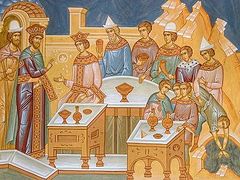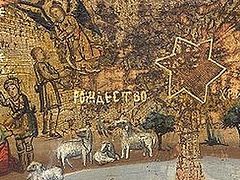In the Gospel we’ve just read, the Lord Jesus Christ teaches that the Kingdom of Heaven is like unto a certain king, which made a marriage for his son, And sent forth his servants to call them that were bidden to the wedding: and they would not come (Mt. 22:2-3). What inattentiveness, what pride, what ingratitude, what audacity!
But what forbearance and long-suffering from the king! Again, he sent forth other servants, saying, Tell them which are bidden, Behold, I have prepared my dinner: my oxen and my fatlings are killed, and all things are ready: come unto the marriage (Mt. 22:4).
And how did those who were invited respond to this new invitation from their good king? But, the Gospel says, they made light of it, and went their ways, one to his farm, another to his merchandise. And the remnant took his servants, and entreated them spitefully, and slew them (Mt. 22:5-6).
But now hear what the king did with these insolent and ungrateful ones. Hearing of such impudence from those who were invited to the marriage, he was wroth: and he sent forth his armies, and destroyed those murderers, and burned up their city. Then saith he to his servants, The wedding is ready, but they which were bidden were not worthy. Go ye therefore into the highways, and as many as ye shall find, bid to the marriage. So those servants went out into the highways, and gathered together all as many as they found, both bad and good: and the wedding was furnished with guests. And when the king came in to see the guests, he saw there a man which had not on a wedding garment: And he saith unto him, Friend, how camest thou in hither not having a wedding garment? And he was speechless. Then said the king to the servants, Bind him hand and foot, and take him away, and cast him into outer darkness, there shall be weeping and gnashing of teeth. For many are called, but few are chosen (Mt. 22:7-14).
Here ends today’s Gospel reading. This story is called a parable, that is, an image, or a mystery, as it were. We have to work out its meaning.
Who is this king who prepared a wedding feast for his son? It’s God the Father, Maker of Heaven and earth and King of all creation. Who is the king’s son? It’s the Only-begotten Son of God, our Lord Jesus Christ; and His bride is the Church—firstly, the Jewish people, chosen by God, and secondly, the soul of every believing Christian. Christ loved the Church, it’s said, and gave Himself for it (Eph. 5:25). The Apostle Paul says: I have espoused you to one husband, that I may present you as a chaste virgin to Christ (2 Cor. 11:2).
The marriage feast means the Kingdom of Heaven, where true believers are united forever with the Lord Jesus. The Jews were first of all invited to this marriage, to the Kingdom of Heaven, through the Prophets and Apostles, but they refused the invitation. Moreover, they even abused the messengers of God and killed many of them. In response, God later annihilated the Jewish people with the weapons of the Romans and destroyed their city and Temple.
Instead of the Jews, God called pagan peoples to the marriage, to His Church, through the Apostles and the Equals-to-the-Apostles, including us, the Russians. But the Christians who were pagans and the Christian families who followed after them also won’t all enter into the Kingdom of Christ. Those who don’t maintain the purity of the bright wedding garment of innocence and holiness that they received at their Baptism, or who after defiling it with sins don’t cleanse it with tears of repentance, will be cast into the outer darkness at the Last Judgment, where there will be eternal weeping and gnashing of teeth.
This is the interpretation of the given parable! But there could be another, similar, equally true interpretation, and with a closer application to us, brothers and sisters. The wedding feast in today’s Gospel reading is the Divine Liturgy, at which the faithful are offered not a slain calf, but the Lamb of God Himself, slain as a sacrifice for the salvation of us sinners, that we might be nourished by His Most Pure Body and Blood; that we might be united with Him in the closest of unions; that we might be flesh of His Flesh and bone of His bones.
This is the marriage of the king’s son—the union of Christian souls with Christ in the Mystery of Communion! This is the feast—partaking of His Flesh and Blood! A Divine, most holy, incorrupt, Heavenly, and deifying feast!
But how many make haste to this Divine feast now? Does not the majority rather avoid attending this Heavenly supper out of negligence and laziness or for various worldly considerations? For example, because they sold something, or because of lack of faith and arrogance, or because they overslept, and so on? Who doesn’t see this, doesn’t notice it, doesn’t know it? Such is our lack of faith; such is our spiritual dullness; such is our propensity for the world; such is our inattentiveness to the greatest mystery of faith, to the mystery of immortality and deification! Such is the vanity and ingratitude of Christians to the Lord, Who offers Himself as food and drink for the sake of purification, sanctification, and eternal life!
What are they worthy of? Is it not rejection by God, given that they themselves have rejected Him nearly all their lives? But even those who come to this marriage of the Lamb, to the Divine Liturgy, in remembrance of His life, preaching, miracles, blessings, sufferings, death, burial, Resurrection, and Ascension into Heaven, or for the communion of His Most Pure Body and Blood—do they come in wedding garments, with pure souls, with pure hearts, with Heavenly thoughts, with a holy disposition? Is it not with earthly dreams and passions that many come to church, to this Bridal Chamber of Jesus Christ, as it were?
Do we ourselves, the celebrants of the terrible, Heavenly, bloodless Sacrifice always come to church and serve in the wedding garment of purity and spiritual dispassion? Alas! Often, we come without our wedding garment and without any reverent thoughts or intentions in our hearts; often, we come in the unclean rags of the passions.
Let us all make haste to repent and whiten the garments of our souls with tears of repentance and deeds of righteousness, especially by alms, which cleanse our sins.
“Thy bridal chamber I see adorned, O my Savior, and I have no wedding garment that I may enter. O Giver of Light, enlighten the vesture of my soul, and save me.”[1] Amen.




